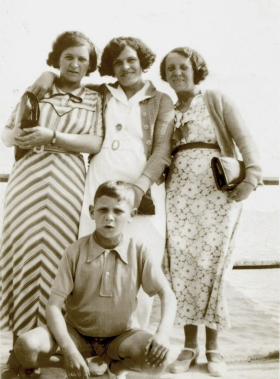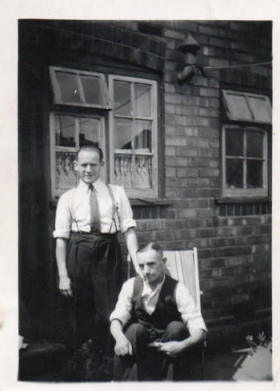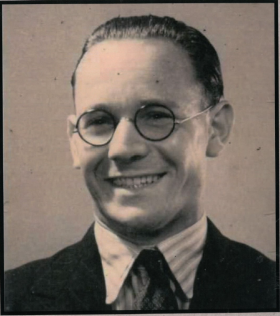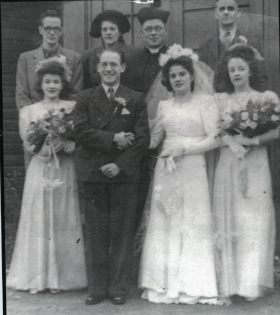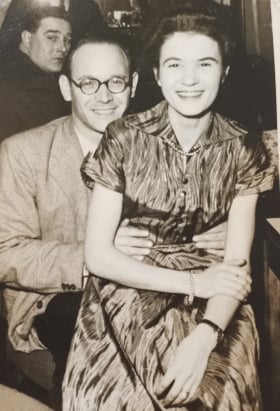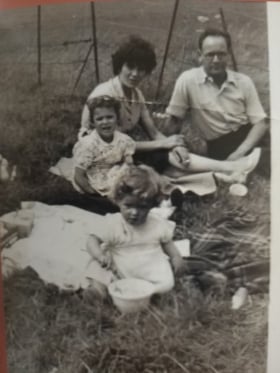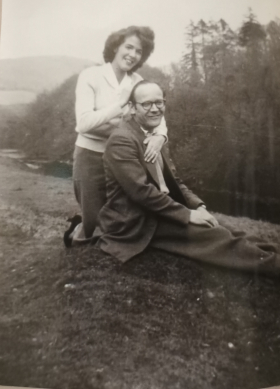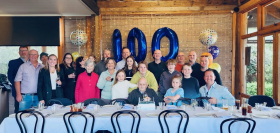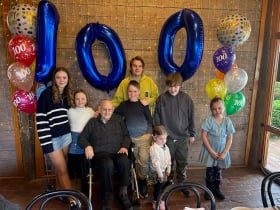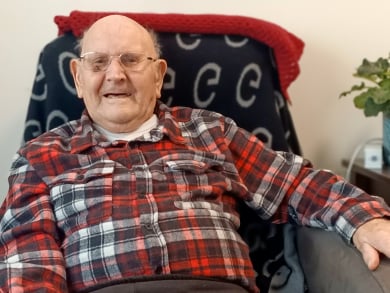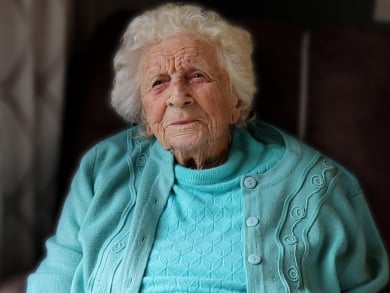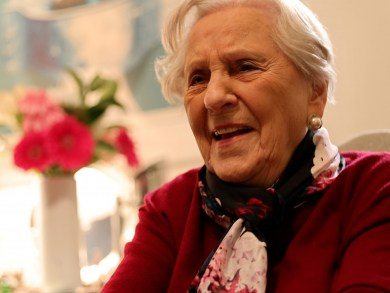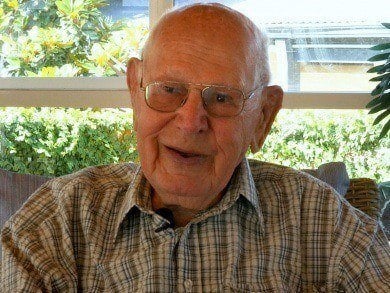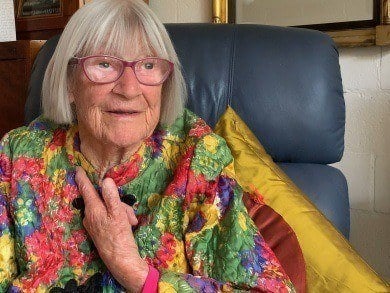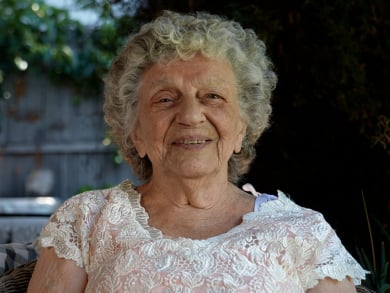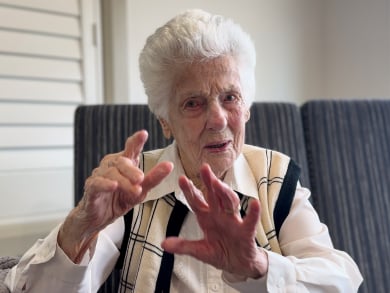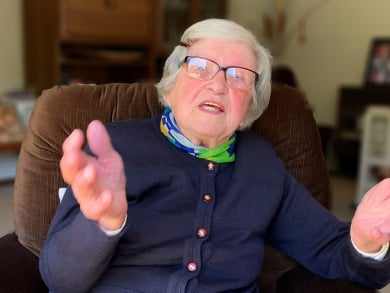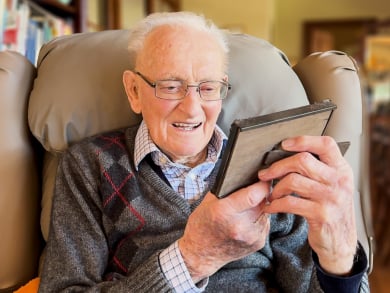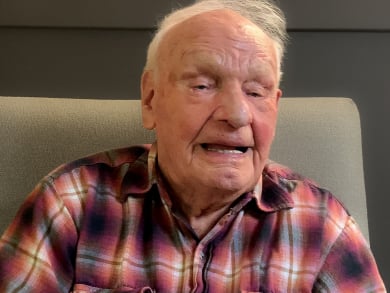Closed captioned icon
View audio transcription
Some people used to think that I was mad.
“We can't understand you two, one minute
she's going to kill you
but if I say something [bad] about you,
she’ll want to kill me!”
And they could never understand
how we got on.
Howard Shelley.
Howard Alfred Shelley.
I was born in West Bromwich.
Part of Birmingham.
My parents,
Alfred Shelley
and Margaret Shelley.
Well, I'm an only child.
My mum worked at
the Hercules cycle factory in Birmingham
and my father worked
at the General Electric Company.
My Dad always used to get me to put his bets on
for him with the local bookie
when I was a kid.
And, I consequently bet on horses
all my life.
Much to my
despair at times.
Not very successfully, I tell you.
My grandmother,
my father's mother,
she lived in West Bromwich.
She was was a miner's wife.
My memories of her is
just sitting by the stove
with the kettle on.
She was a very severe woman in black.
And they heard
she'd been playing around with some bloke.
I remember we walked down there this day,
we found we were in the midst
of a bit of a family business.
She sat there and looked at us all,
and she was a tough old bird.
Although she was playing around
with a bloke she's a tough old bird.
And, she said “Alfred!
Make this tea”.
She didn't get off her bum herself mind you,
and Alfred
had to get up and make the tea
and look after us whilst she sat down and
had court, you know,
“The rest of you can listen to me.”
On our holidays,
which in those days
consisted of one week.
That’s all people got off.
Dad would rush home on the Friday night,
we’d grab a suitcase,
jump on the train,
and go down to Torquay.
And my greatest pleasure was
the company of donkeys on the beach.
I was 14 when I left school.
You had to leave school at 14
unless you were
clever enough to go to secondary college
which I wasn't.
I went to work for a plumber.
and I got ten shillings
and sixpence a week
which I had to hand over to
my Mum every Friday
because things were tight.
All my friends were working in the
munition factories
and earning good money.
I thought, blow this, this is no good,
they're going to dances and pubs
and so
my mother got me a job at
the cycle factory.
The war started.
I was conscripted into the army.
And I was posted
up to Catherine Camp in Yorkshire.
I walked into the canteen
in Catherine Camp
and this young lady was behind
the counter.
Mary Bernadette Woodgate.
She was in the
Women’s Army Corp.
So a bit of banter started.
Bit of cheek
and I finished up marrying her.
My wife was Irish.
County Kilkenny.
And she loved a good argument
or a good fight.
She’d fight anybody.
You upset her and boy were you in trouble.
You could have been
six foot four and she was five foot two.
Yeah, she wasn’t a bad looker, was she?
Different to me!
I remember the duty officer
and the duty sergeant come marching down.
“Where’s Trooper Shelley?”
“We understand you have
a girlfriend in the ATS.
Private Woodgate.”
I said, “Yes. What’s she doing now?”
And he said, “Well
you better come with me.”
And we went into the cookhouse
and there is Patsy with a knife.
Patsy had took offense
at something this girl said.
And it got a bit more than fisticuffs.
Patsy was going to kill her.
What for I don't know.
I could talk sweet-talk her
and so I had a chat with her.
At any rate Patsy dropped the knife.
We did calm her down
and they took her away
and she got seven days’ ‘jankers’.
She had to go down the cookhouse
and sit there all day
with a big bag,
bags and bags of potatoes, carrots and like
and peeling them all day long.
But she was lucky she got away with that.
If it had been like a civilian court,
she’d have been in big trouble.
I remember when we first finished our
training,
all gathered together, bunged on a train,
given the kit bag, I was kitted out and
we were going overseas
because the war was
in full swing.
All sorts of rumors
where we were going.
We thought we were going out to Burma,
out that way,
because of the clothing we were issued.
Light khaki. Not heavy.
We were traveling through the night.
The train pulled into a station.
The Red Caps got on, the hated Red Caps.
That's the military police.
And they just said, “You there!
Line up on the station.”
We were marched off
down the road a little way.
Out the train went
with the rest of the boys on it.
And
most of those boys were,
unfortunately,
you know killed.
Pure,
absolute pure luck.
I was in the army for
five & a half years
and never fired a shot in anger.
I never went abroad.
I was always stationed [here]
and they moved me around.
I was one of the fortunate ones.
I went to a place in
Chertsey in Surrey.
‘Fighting Vehicle Proving Establishment’.
It’s where the armourment factories
were rapidly
making tanks and armored cars
and they used to rush prototypes
down there and we had to test them.
We’d jump in a tank or or a car,
trying to bash the car up.
Not smash it up, like dent wise,
but drive it as hard as you could
and make it break down.
They find out why it broke down
and make sure it doesn’t
break down again.
We had friends and
myself and the husband went for a beer.
The two women were having cups
of tea at home and God knows what.
When we got back to the house.
after being in the pub,
the place was strewn with papers.
it was all about going to Australia.
The couple were going to emigrate
and so by the time I got home that night
I think we were going to emigrate.
And we got on the Fairsky and
come out to Australia.
My father was on his own then.
He came to see us off on the ship
and Southampton was
the last time I saw my father.
We arrived in Fremantle
and so we got off the ship.
There was a line of desks
and that on the wharf.
I walked up to the bloke
and put my hand out to shake hands
with him.
He just ignored it.
And I said I was
a truck driver which by that time I was.
He said,
“Trucks drivers are ten a penny here.
We need people in the building trade”.
And I said, “Well that's nice isn’t it,
to tell me now!
I'm here with two girls.
A wife and two girls”.
He said,
“Well if you don't want to get out here,
if you go back on the ship,
see the purser,
and the ship will go to Adelaide
or Melbourne
or Brisbane.
And after that you're on your own
to go back to England again.
I thought this is a great introduction,
considering
you're asking for migrants to come
but that's the sort of greeting we got.
And that's what we did,
we got on, and when we got to Melbourne
they called us up.
There was a different reception
all together.
Had an interview and
we were put in
the huts used to be
behind the Exhibition Building.
And he called me in the office
and he said,
“Would you take a job in a factory?”
And I said, “I’ll take any job.
That's what I came for.”
And up there in Albert Street there was
a factory.
A. G. Healing.
They made televisions and radios
and things like that.
They said, “Yeah, here, we’ll give you a job.”
And then they also said,
“If your wife’s looking for a job,
we can give her a job.”
And I started my working life there
and worked there for 20 years.
Thanks To
Lisa Biviano
Howard Shelley
"I was one of the fortunate ones"
A Journey from West Bromwich to Melbourne
Born in the coal mining region of West Bromwich, England, Howard’s early years were shaped by hard work and resilience. During World War II, he served an essential role as a test driver for prototype tanks and vehicles, contributing to the war effort in a unique way. After the war, Howard and his family took a leap of faith and migrated to Melbourne, Australia, where they built a new life filled with hope and opportunity
Age in Video
100 yearsDate of Birth
21st July 1924Place of Birth
Birmingham, United KingdomThanks To
Lisa Biviano
